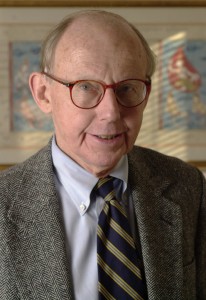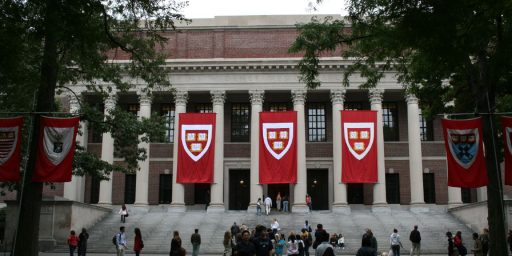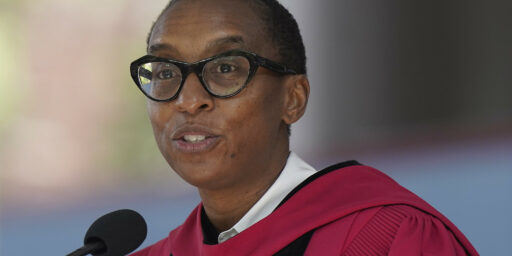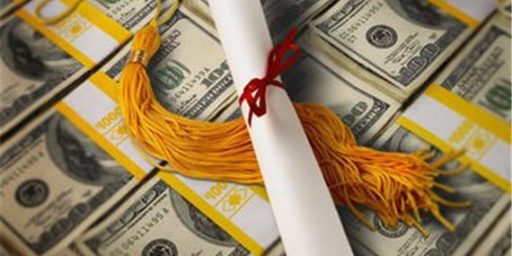Samuel Huntington Dead at 81
Legendary political scientist Samuel P. Huntington died on Christmas Eve, Harvard News reports.
Samuel Huntington, Harvard University's Albert J. Weatherhead University Professor. (Jon Chase/Harvard University)
Huntington had retired from active teaching in 2007, following 58 years of scholarly service at Harvard. In a retirement letter to the President of Harvard, he wrote, in part, “It is difficult for me to imagine a more rewarding or enjoyable career than teaching here, particularly teaching undergraduates. I have valued every one of the years since 1949.”
[…]
He was the author, co-author, or editor of 17 books and over 90 scholarly articles. His principal areas of research and teaching were American government, democratization, military politics, strategy, and civil-military relations, comparative politics, and political development.
“Sam was the kind of scholar that made Harvard a great university,” said Huntington’s friend of nearly six decades, economist Henry Rosovsky, who is Harvard’s Lewis P. and Linda L. Geyser University Professor, Emeritus. “People all over the world studied and debated his ideas. I believe that he was clearly one of the most influential political scientists of the last 50 years.” “Every one of his books had an impact,” said Rosovsky. “These have all become part of our vocabulary.”
[…]
Huntington’s first book, “The Soldier and the State: The Theory and Politics of Civil-Military Relations,” published to great controversy in 1957 and now in its 15th printing, is today still considered a standard title on the topic of how military affairs intersect with the political realm. It was the subject of a West Point symposium last year, on the 50th anniversary of its publication.
[…]
His 1969 book, “Political Order in Changing Societies,” is widely regarded as a landmark analysis of political and economic development in the Third World. It was among Huntington’s most influential books, and a frequently assigned text for graduate students investigating comparative politics, said Dominguez, who is also Antonio Madero Professor of Mexican and Latin American Politics and Economics. The book “challenged the orthodoxies of the 1960s in the field of development,” he said. “Huntington showed that the lack of political order and authority were among the most serious debilities the world over. The degree of order, rather than the form of the political regime, mattered most.”
His 1991 book, “The Third Wave: Democratization in the Late Twentieth Century” – another highly influential work – won the Grawemeyer Award for Ideas Improving World Order, and “looked at similar questions from a different perspective, namely, that the form of the political regime – democracy or dictatorship – did matter,” said Dominguez. “The metaphor in his title referred to the cascade of dictator-toppling democracy-creating episodes that peopled the world from the mid 1970s to the early 1990s, and he gave persuasive reasons for this turn of events well before the fall of the Berlin Wall.”
If there has been a more influential political scientist in the postwar era, his name escapes me. Dan Drezner, who studied under Huntington, observes,
He might have been the most socially awkward political scientist I ever met — not an easy task given my field. This awkwardness disappeared in his writing, which was fluid, cogent, and usually disconcerting to accepted wisdom. This is not to say I always agreed with Huntington — I most certainly did not (here’s me not agreeing with him yet again). But I will miss pushing back at his ideas. One could always debate Huntington’s hypotheses, but only fools would dismiss them out of hand.
Quite so. And one supposes social awkwardness is a key reason he was able to be so productive as a scholar for so long, writing at least one truly impactful book every decade of his long career.
UPDATE: This passage from a 2001 Robert Kaplan profile is amusing:
The book [Soldier and the State] enraged many of Huntington’s colleagues in Harvard’s Department of Government, and the following year the department denied him tenure. With his close friend Zbigniew Brzezinski (whom Harvard also did not promote), Huntington went off to teach at Columbia University.
Harvard is infamous for passing over outstanding junior professors for promotion, forcing them to go elsewhere for tenure.







Samuel Huntington passed on Christmas Eve. It’s the death of a legend in political science. http://tinyurl.com/8vsga3 via @jeffq73
RT @stinson: Samuel Huntington passed on Christmas Eve. It’s the death of a legend in political science. http://tinyurl.com/8vsga3
Samuel Huntington passed on Christmas Eve. It’s the death of a legend in political science. http://tinyurl.com/8vsga3
I can’t say I’ve agreed with SPH of late, but he truly was a legend in the discipline – http://is.gd/dKVh
I can’t say I’ve agreed with SPH of late, but he truly was a legend in the discipline – http://is.gd/dKVh
Legendary … that pretty much sums it up.
FYI: his name is Henry Kissinger
Perhaps I should have written, “political scientist qua political scientist.” I’m sure lots of people with political science degrees — even political science PhDs — have been more influential than Sam Huntington. Condi Rice, Zbigniew Brzezinski, etc. But their influence was as policymakers rather than as academics.